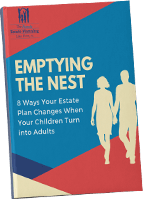As a parent, you’re likely thinking about all the ways you can protect and nurture your little ones. One of the most important decisions you make as a parent, is choosing the guardians who will take care of your child if something were to happen to you and you were no longer able to care for them. Selecting a guardian who will ensure your child always feels loved, cared for, and protected is a decision you want to be in control of. With proper estate planning, focused on the needs of young families, there are two time frames for guardians; long-term and short-term.
Long-Term Guardians
Long-term guardians are the people you trust to raise, love, and guide your child if something happens to you. Imagine your child being raised by someone who knows your values, shares your parenting style, and will love your child as their own. These are the individuals who would step in and take on the full responsibility of parenting your child until they turn 18. It’s comforting to know that someone you trust will be there for the long haul, ensuring your child grows up in a nurturing and supportive environment.
Short-Term Guardians
But what if your long-term guardians aren’t immediately available when your child needs them most? This is where short-term guardians come in. Picture this: you’re unexpectedly unable to care for your child, and your long-term guardians live far away. The thought of your child being cared for by strangers is heart-wrenching. That’s why short-term guardians are so important.
Short-term guardians are trusted individuals who live nearby and can quickly step in to care for your child if something unexpected happens to you. These are the people who can be at your home in minutes or take your child to their home, providing immediate care and comfort until your long-term guardians can arrive. We often call short-term guardians “first responders” because they are the first people to be with your child in an emergency, ensuring your child is safe and loved during those critical moments.
Do You Need Both Types of Guardians?
The short answer is, yes.
Having both short-term and long-term guardians in place creates a seamless plan for your child’s care. For example, if something were to happen while your child is at daycare, a short-term guardian could quickly step in, ensuring your child is never left feeling scared or confused. Once your long-term guardians arrive, they can take over and provide the stability and love your child needs as they grow up.
By planning for both scenarios, you’re giving your child the best possible protection, ensuring they are always cared for by people who love them, no matter what happens.
Take the First Step in Protecting Your Child’s Future
Whether you’re preparing for your baby’s arrival or rooting them on at soccer practice, it’s comforting to know that you’ve done everything you can to protect them.
Take the first step in protecting your child’s future by sitting down with us to create a comprehensive estate plan, to include guardianship. At The Parents Estate Planning Law Firm, we understand the unique needs of expecting parents and are here to guide you through every step of the process.
We’ll help you choose the right guardians, both long-term and short-term, to ensure your child is always surrounded by love and care.
Don’t wait until it’s too late—schedule your Planning Session today by calling us at 978-263-6900 or contacting us online. Let’s work together to ensure your child’s future is filled with love and security.












